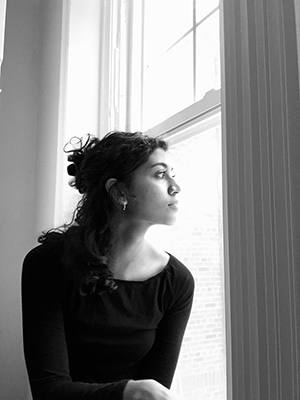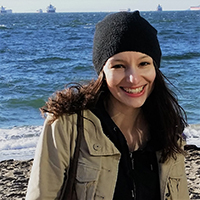Histories of Exile: Mel Hiebert
in Conversation with Janika Oza

Malahat Review volunteer Mel Hiebert talks with Janika Oza, winner of the 2019 Open Season Award for Fiction with her story, “Exile.”
Janika Oza is a writer, educator, and graduate student based in Toronto. She was a 2018 VONA/Voices fellow and a scholarship recipient from GrubStreet in Boston. Her fiction, poetry, and non-fiction have been published in a number of journals including The Columbia Review, Into The Void, Hobart, SmokeLong Quarterly, The Goya Journal, and Looseleaf Magazine, among others. She is currently working on her first novel. Find her at www.janikaoza.com.
Read what contest judge Carmelinda Scian had to say about Oza's winning story.
Your winning story "Exile" touches on many themes besides the one in the title – we see threads pertaining to memory, abandonment, rebellion, and conformity. In telling this story, what were you hoping people would understand about these themes, and how they connect to what it means to be exiled?
As I wrote the story, I was thinking about how conformity and obedience often arise out of survival, the idea of having to keep your head down and work quietly rather than making noise. And I think this is particularly true for people who have fled persecution or political upheaval, where resisting or rebelling could have very material consequences on their lives. I wanted to explore how the two adult characters in the story might carry this with them and still feel the need to stay in line, even after their circumstances have changed. At the same time, I’m curious about how this belief manifests and changes in the next generation – how the young girl intuitively understands the way her parents need her to behave, and yet is discovering the ways she can still challenge and resist. The themes of memory and forgetting are also ones that I’m always playing with – how memory haunts, but also how it can hold the truest belonging.
Your writing often features rich descriptions of food that engage the entire spectrum of our senses. What role does food and the daily rituals associated with food play in "Exile"?
Thank you for asking this question – it’s maybe my favourite thing to talk about! My writing always gravitates towards food, so much so that I often don’t realize it until someone points it out. Food is really central to my understanding of family, community, and relationships, and so in my writing it has become an important lens for me to explore these dynamics. In the story, the kitchen becomes a space of power and ownership for the mother, in contrast to the other disempowering spaces she occupies in her life. In cooking for and feeding her family, the mother gains some control within the boundaries of her home, but we also see how her daughter wants to challenge this, because her understanding of power and control is informed by her memory of the dictator in their past. Food in this story became a tool for me to show the different ways that each member of the family might carry the same memories, but it’s also just something that brings them together, a kind of relief and solace that binds them.
You're currently pursuing a Masters degree in Immigration and Settlement Studies. How has this more academized lens of approaching themes like migration and displacement had an impact on your work or changed the way you approach your writing? Has there been something specific that you've come across in your studies that has influenced (or likely will influence) your future work?
Being in a Masters in Immigration/Settlement while also writing creatively around these themes definitely has some crossover – the academic program gives me a more theoretical and structural understanding of very real issues that migrants are facing, while the writing lets me come down to the individual level and think about how people live and thrive through whatever else might be happening. Both of these feel intensely personal and urgent. At the same time, my writing doesn’t exist outside of the politics and structures that we discuss in my Masters. I write within, for, and because of this: it feels necessary for me to orient my work towards justice, to reconstruct understandings through storytelling. My Masters research is also allowing me to listen to migrant narratives in foodspaces around Toronto, and while I’m conscious not to co-opt anyone’s story, the themes and nuances filter into my writing. In terms of specific influences, the margins of my school notebooks are filled with little jot notes from moments in class when we’re talking about a case or a paper that sparks an idea for a story.
A lot of your work touches on themes of identity, both in your nonfiction writing as well as your fiction pieces. How has your sense of what "identity" means evolved over the years, and what role has this played in your writing?
To be honest, I’m not sure what writing would be if it weren’t about identity in some way. For me, writing is both personal, a way to process the world, reflect on my identities, negotiate with what I think I know and what I’m learning. But it’s also political, a way for me to connect with movements for justice and grapple with questions I want answered. I think I understand now more than before how people are complicated and can hold many, many identities at once, and also how these can shift and grow, how nothing is fixed. When I write fiction now, I try to write in service of the characters rather than imposing what I want to happen for them – so asking, how would this person really act, or feel, or love, in this moment? How can I write in a way that lets people be whole, complicated, and porous?
Is there anything you would like people to understand about your work that they may often overlook?
I’m drawn to writing around themes of displacement and migration because these stories exist in my histories and my family, but I’m resistant to the idea of being pinned down as an immigrant writer, or as someone who writes only about one thing. But also, I think it’s pretty ridiculous to imagine that writers who write about migration are all telling the same narrative. That’s just a way of silencing the multitude of stories that people are working hard to tell. The idea of home, for me, is complicated, as in there can be many homes and many kinds of homes – the home of now, the home of ancestry, the home of circumstance, the home you can’t revisit. So when I write about the idea of homeland, I’m trying to make space for those whose attachment to the homeland is fraught or uncertain and to complicate the idea of having a single identifiable place of belonging. The stories I write are the ones I feel I need to write, and part of this is about resisting stereotyped narratives and challenging the language we use to talk about otherness, while still calling on ideas of nostalgia and belonging that feel very real to me. What I’m trying to say here is that to write about an immigrant experience is also to write about a human experience, and this deserves not to be overlooked.
I understand that you are currently working on a novel; can you tell us a bit about it? In what ways does this novel converge towards or diverge away from your past works?
I’ve been working on my novel for over a year now, which is exploring many of the themes found in “Exile.” The novel centers around a family within the Indo-Ugandan community, both in Kampala as well as in Canada as refugees after the 1972 Expulsion. Over several generations and countries, the novel is weaving together a portrait of a family fragmented by political upheaval and explores the ways we survive and love in spite of history. The major themes are in line with my previous works, because that’s what matters to me: it’s a story of dislocation and memory and tenderness within family. But because it’s a novel grounded in real histories of exile and resettlement, I’m taking very seriously the research and the lived experiences of the Indo-Ugandan refugee communities, which is an important divergence from my previous work. I’m also allowing myself to experiment a bit with form and perspective, but I think that’s all I’ll say here.

Mel Hiebert
* * * * * * * *









